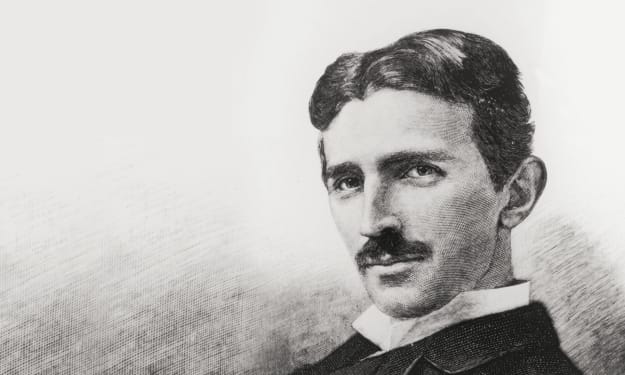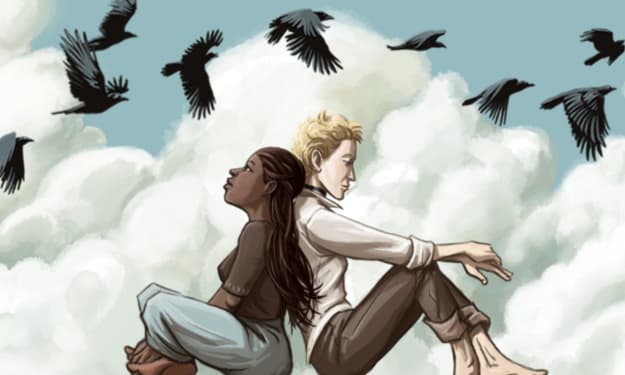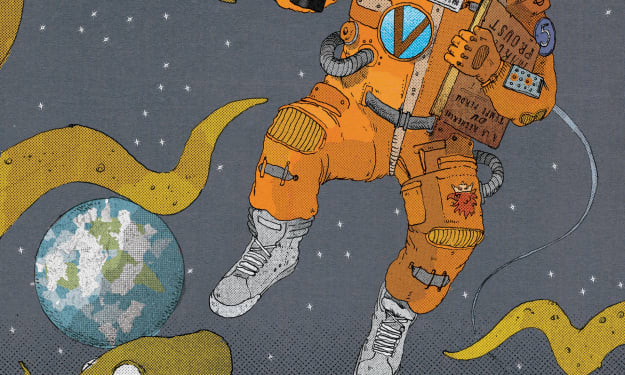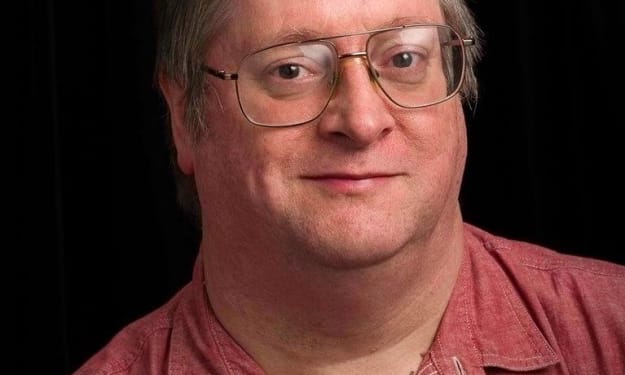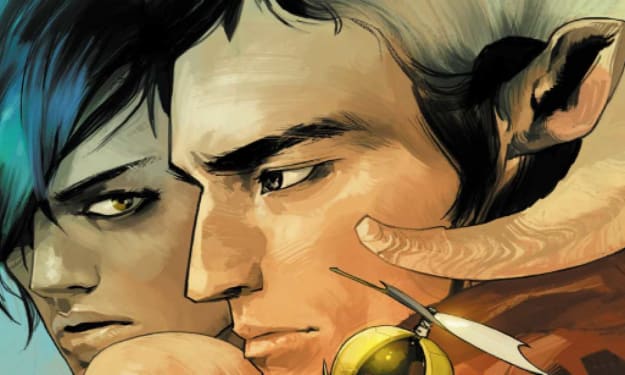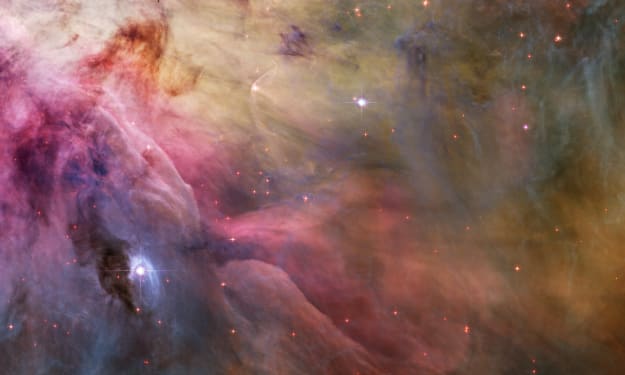literature
Science fiction's most popular literary writers from Isaac Asimov to Stephen King and Frank Herbert, and the rising stars of today.


Buried Screwball Facts About Nikola Tesla
Travel anywhere outside the United States and the name of Nikola Tesla is known. Ask the average person on an American sidewalk? They’re apt to recall the 80’s rock band. Or they’ll nod and mumble about Elon Musk’s motor company.
Matt CatesPublished 7 years ago in Futurism

‘Forbidden Planet’ - A Sci-Fi Haunted House Tale
“In times long past, this planet was the home of a mighty, noble race of beings who called themselves the Krell. Ethically and technologically they were a million years ahead of humankind, for in unlocking the mysteries of nature they had conquered even their baser selves, and when in the course of eons they had abolished sickness and insanity, crime and all injustice, they turned, still in high benevolence, upwards towards space. Then, having reached the heights, this all-but-divine race perished in a single night, and nothing was preserved above ground.”
Will StapePublished 8 years ago in Futurism

Isaac Asimov's Autobiography: In Memory Yet Green
I ran into my pal, Matthew B. Tepper, a fellow Isaac Asimov enthusiast at the L.A. Science Fiction and Fantasy Society. To date, he owns 465 of the 515 books Asimov wrote. I asked him if he had any suggestions of what I ought to read that most people hadn’t from his oeuvre. He brought me into LASFS’ extraordinary library. Therein he pulled out the first volume of In Memories Yet Green, Isaac Asimov’s autobiography and said “read this.”
Joshua SkyPublished 8 years ago in Futurism

The House Had Eyes
Every morning I wake up and crave three things: Sex, coffee, and my phone. Usually, the closest thing on hand is the phone—but before I reach for it, a thought always flits through my being—this doesn’t have the answers. I reach for it anyway. And all too often, I’m disappointed.
Joshua SkyPublished 8 years ago in Futurism

Sci-Fi Webcomics to Devour All At Once
Not so long ago, there weren't enough great sci-fi webcomics to shake a ray-gun at. Now, you've got serious options for pretty much every sub-genre you can imagine, from hard sci-fi to space opera to satirical speculative space fantasy. Here's my list of the best sci-fi webcomics to make you laugh, make you think, and feel like a kid again with the best Sunday paper in the galaxy.
Sarah QuinnPublished 8 years ago in Futurism

‘The Invisible Man’ - Science Fiction’s Great Horror & Humanity’s High Tech Desire
“An invisible man can rule the world. Nobody will see him come, nobody will see him go. He can hear every secret. He can rob, and rape, and kill! Power, I said! Power to walk into the gold vaults of the nations, into the secrets of powerful kings, into the Holy of Holies; power to make multitudes run squealing in terror at the touch of my little invisible finger. Even the moon's frightened of me, frightened to death! The whole world's frightened to death! “ -
Will StapePublished 8 years ago in Futurism

Space (Part II - Vonnegut's Cat's Cradle)
In my last article, I discussed William Gibson's cyberpunk classic Neuromancer as a key text in the convergence between science fiction and postmodernism. This time, I want to stay right on the cusp and consider the case of Kurt Vonnegut, who happens to be the writer who made me want to be one myself someday.
M. Thomas GammarinoPublished 8 years ago in Futurism

Interview with Martin Shoemaker
Omni had the opportunity to speak with Martin L. Shoemaker, multi-award winning author and professional programmer. His short story Today I Am Paul was nominated for a Nebula Award and he has won much accolade in the span of his six year career. Martin has written for publications such as Analog, Galaxy’s Edge and Clarkesworld. He has a number of upcoming projects, including several novels.
Joshua SkyPublished 8 years ago in Futurism

Sci-Fi's Obsession with Ancient Greece and Rome
Sometimes science fiction returns to the past for places, people, and themes to enrich its mind-journeys into the future. Such is the case with these sci-fi movies, TV episodes, and works of fiction, each one drawing from the ancient worlds of Greece or Rome to dress its story. Brit Marling, a screenplay co-writer of Another Earth, says that this isn’t really surprising. “We’re retelling the same dramas from Ancient Greece,” Marling said. “These stories are so fundamentally old, the mythology that they come from, the hero’s journey — the way a narrative works. Science allows you to take the same story and see it from a new perspective because the science is always new and fresh.” Science fiction’s interest in the ancient world goes beyond mere allusion, as in the middle name of Captain James Tiberius Kirk (Tiberius, in case you’re wondering, was a somber, reclusive Roman ruler who nevertheless left the empire in a better state than he found it). If you’re deeply interested in how the speculative worlds of the future and the worlds of ancient Rome and Greece intersect, you may be interested in a serious paper by academic Tony Keen, “The 'T' stands for Tiberius: models and methodologies of classical reception in science fiction.” If that sounds a little heavy, enjoy the following summary of a few times when togas, laurel wreaths, aliens, and spaceships partied it up in one crazy combination.
Sarah QuinnPublished 8 years ago in Futurism

The Best New Sci-Fi Graphic Novels
Picture books aren’t just for kids. In fact, when it comes to the best sci-fi graphic novels, they usually aren’t for kids at all (here be mature themes, like crazy alien sex and buckets of violence). Immerse yourself in tantalizingly rendered stories of robots, aliens, human beings, and creatures that lie somewhere in between. From struggling underwater colonies waiting for an inevitable supernova to the madcap adventures of all-American scientific geniuses, you’ll find the story that’s right for you - one that's harder and harder to tear yourself away from.
Sarah QuinnPublished 8 years ago in Futurism

Sci-Fi Books that Changed the Genre Forever
When thinking of sci-fi books that changed the genre forever, there are a number of contexts that need to be considered. Science fiction books have been know to predict the future and speak to the past in a way that few other forms of fiction do. They point out social issues and bring up questions of morality and the human condition. The great ones are the first to do so or to do it in a way that is so wholly unique as to influence that world around them. Great sci-fi novels also inspire the generations after them. Here is a list of sci-fi books that changed the genre forever.
Peter CarriveauPublished 8 years ago in Futurism

Heart-Rending Poems for Sci-Fi Fanatics
Distant relatives to the familiar "Twinkle, Twinkle, Little Star," these sci fi poems are raw, real, and sometimes almost too close for comfort. They blur the line between speculation and reality in their carefully composed stanzas and bring us to mini existential crises - not earth-shattering ones. Each is just the right size to bring along to a good evening of poetry for the starry-eyed dreamer. (And if no one you know is cool enough to host one, you'd better send out invitations to your own. I suggest hot beverages, an antipasto platter, and no, I'm not doing anything, of course I would be delighted to come, thank you for asking!)
Sarah QuinnPublished 8 years ago in Futurism

